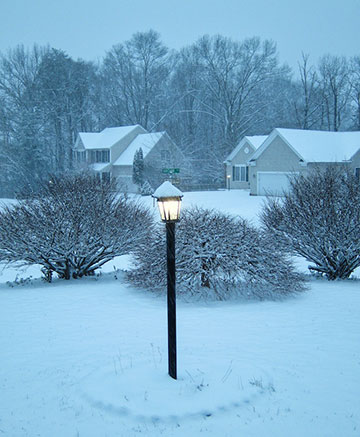 Long ago, on windy, wintry nights, I’d look out the window by my bed as trees shifted for a glimpse of a light deep in the woods. The yellow light — on and off as the wind tossed — kept me up late, wondering. We had no neighbors on the other side of our woods.
Long ago, on windy, wintry nights, I’d look out the window by my bed as trees shifted for a glimpse of a light deep in the woods. The yellow light — on and off as the wind tossed — kept me up late, wondering. We had no neighbors on the other side of our woods.
Daytime, I’d stray into the woods, following rabbit snow-tracks, walking until my nose froze. I never found a house. The light, I believed, came from a hidden world. I was eleven and had just read C.S. Lewis’s The Lion, the Witch, and the Wardrobe. Our house, sadly lacking in wardrobes, had only disappointing closets. I longed to feel, as Lucy did, soft fur coats giving way to scratchy branches and hard floor turning powdery and cold underfoot.
Most of all, I wanted to come upon the source of the mysterious light in our woods, surely a lamppost with a faun named Mr. Tumnus hurrying past. “Fantasy,” as J.R.R. Tolkien says in his essay “On Fairy-stories,” “starts out with an advantage: arresting strangeness.” Lewis founded Narnia on arresting strangeness, elements that didn’t normally go together, like lampposts and package-laden fauns.
Narnia was a world seemingly without order. Fauns serving sardines on toast for tea, beavers with gum boots, a wicked witch, Father Christmas, a wish-granting stag, and Aslan, the majestic golden lion. I’m aware that Lewis borrowed lavishly from Anderson (“The Snow Queen”), Graham (The Wind in the Willows), E. Nesbit (“The Aunt and Amabel”), but as a child, I didn’t care. Neither did author Lev Grossman. He admits Lewis’s “exuberant, improvisational” method inspired his Magicians trilogy.
Lewis’s close friend Tolkien did care. He felt the Narnia books were hastily written and the world-building was sloppy, a mishmash from different mythologies. It has been said that the lamppost in The Lion caused a rift in their friendship. In his essay, Tolkien declares modern inventions have no place in fantasy: “The electric street-lamp may indeed be ignored, because it so insignificant and transient. Fairy-stories have many more permanent and fundamental things to talk about.”
Yet Lewis planted the lamppost in Narnia, often attributed to a particular one in Oxford where both Lewis and Tolkien taught. To needle his mentor who’d meticulously crafted The Lord of the Rings over many years? Doubtful. Tolkien converted atheist Lewis to Christianity and Lewis ran with it, writing books and giving standing-room only lectures. His popularity eclipsed Tolkien’s own career and they departed ways. In the end, though, Tolkien received more attention and accolades than he ever wanted.
I fell upon The Lord of the Rings at age fourteen, gobbling one volume after another, hiding the ones I hadn’t yet read behind the shelf in the public library. From the moment I finished the final page of The Return of the King, I desperately wanted more, just as I’d desperately wanted to find Narnia. Mentally I moved into Middle-earth and stayed there for ten years.
Even now when I re-read the books, I can’t see myself anywhere in Middle-earth. If I were a female hobbit, I’d be relegated to drawing pints at the Green Dragon or raising little hobbits. I still love the place, but I don’t fit there. The children in the Narnia books are like me (or like I was). I could easily imagine myself pushing through the back of a wardrobe or slipping into a painting to reach that world.
The lamppost in the woods is never explained. In The Magician’s Nephew readers learn that the lamppost grew from Aslan’s magic. But there’s no electric cord, no lamplighter to ignite the gas. It’s where Narnia begins, the boundary between a land trapped in endless winter (in the first book) and the “wild woods of the west.” It is as alive as the trees in the forest. “There is,” Lev Grossman writes, “something indescribably strange and romantic about the image.”
These days, fantasy writers following Tolkien’s path must deliver a believable Secondary World. If that world has a green sun, only “through labour and thought,” as Tolkien decrees, will that green sun be convincing. Grossman says writers today “feel as though the fictional worlds they create have to be full-scale working models … Magic, to [Lewis], was a much wilder, stranger thing …I feel as though we’ve wandered too far from the true magic, the kind Lewis wrote.”
I’m backing into fantasy myself, at last writing the kind of books I loved as a kid. As much as I adore Tolkien, I’m aiming for the sense of wonder Lewis flung like confetti in his Chronicles of Narnia. And when I find the lamppost, I know who will be there. Keep the tea hot, Mr. Tumnus.
